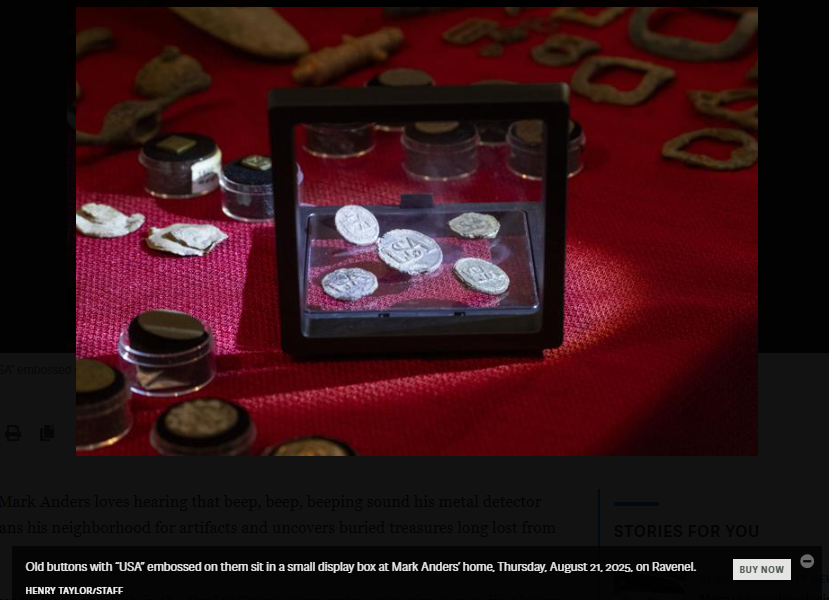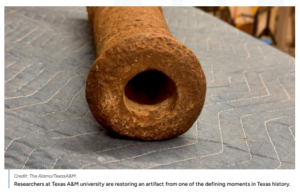RAVENEL — Mark Anders loves hearing that beep, beep, beeping sound his metal detector makes as he scans his neighborhood for artifacts and uncovers buried treasures long lost from centuries ago.
With 6,000 acres to comb through in the Poplar Grove community, sometimes spending hours in a single plot, Anders pieces together the history of the people who lived on the property since the 1600s, be it the Elliott family, George Washington’s potential distant relatives or the smaller characters who made the former rice plantation tick.
Shelves upon shelves line Anders’ home office — his temporary storage until a more permanent neighborhood museum is built. There’s iron pick axes dating back to the 1700s, belt buckles, spurs, utensils and a musket pistol barrel. He has uncovered silver jewelry shaped like a bow and a gold heart locket, as well as dagger guards and Continental Army military buttons.
Digging in the dirt is a lifelong hobby from Anders’ childhood, when he collected coins and bottles with a generic metal detector his mother bought him at Radio Shack.
The retiree moved to Ravenel with his wife in 2020. He now travels the world on leisure digs, most recently visiting England where he detected around a 13th century priory. But his biggest joy these days is spending hours in his “backyard.”
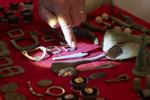
Artifacts from clothing, utensils, and firearms can be seen spread across a table at Mark Anders’ home, Thursday, Aug. 21, 2025, on Ravenel. Anders has combed the land and archeological sites around his home in search of pieces that tell the story of the area itself and amassed something of a small museum.
Anders lives in the Poplar Grove planned development that straddles Charleston and Dorchester counties. With phases still undeveloped, including the 3,500-acre Charles Towne Farms, there is a huge treasure trove for him on the property owned by Southeastern Residential.
Local research has traced the property back to 1696, when it was a working rice plantation named Poplar Grove. Mount Pleasant’s Brockington and Associates, a woman-owned group of archaeologists and historians, found the property had large estate homes that were burned or destroyed during the Civil War, which has led to so many discoveries in one spot.
Vic Mills, CEO of Southeastern, purchased the property for about $14 million 20 years ago from MeadWestvaco. He has since given Anders permission to explore the land that’s still undeveloped.
“(Vic’s) entrusted me to to go back there and find as much as I can, because he and I are on the same page with everything,” Anders said. “I felt like a lot of these items needed to stay with the property, and so I asked if I could donate items and basically create a little mini museum.”
Mills, a fellow history buff, was thrilled with the idea. The plan is to publicly display the keepsakes in Southeastern’s new office at the entrance to the community, which Mills said should wrap up by the end of the year.
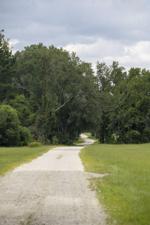
A dirt road leads off into Dorchester County to land Mark Anders searches for artifacts on, Thursday, Aug. 21, 2025, on Ravenel.
“We had no idea what we would find, but we were fortunate to have Mark and his associates expressing an interest in doing the research and spending the time on so much of the property for so long,” Mills said. “He was able to put together a vast collection of artifacts that clearly identified when they would have been lost on the property going back to the Revolutionary War, throughout the plantation time frame of rice fields and other agricultural functions on the property up until the Civil War.”
Anders and Mills agreed that whatever was found would be the property of Poplar Grove.
“We plan to display them and continue to search for additional artifacts in hopes of continuing to build a wonderful collection,” Mills said.
A rare collection, researched by many
Pieces range from generic buttons and splintered pottery to items like a one-of-a-kind engraved “love token.”
“They would take silver coins and rub and rub until they were smoothed, and they would monogram something on them and give them to their love,” Anders said of one coin in particular with the initials J and B.
Buttons with the South Carolina militia and navy emblems shine in its box alongside a pewter button from a member of Gen. George Washington’s Continental Army based in North Carolina. Anders estimates it was worn between 1776 and the early 1780s.
“It has an N at the top and a C at the bottom,” he said. “Those are hard to come by. Those are what our guys wore.”
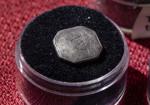
A button with a “W” carved into it can be seen on display inside a small container at Mark Anders’ home, Thursday, Aug. 21, 2025, on Ravenel.
Several cape clasps that held draped fabric to a uniform feature fish etchings and Scottish thistles.
Anders has found barrel taps, thimbles and stirrups.
“These two little things here are apothecary weights,” he said of a pair of tiny metal artifacts. “The druggest, when he’s mixing stuff, had these to weigh the amount of the drug.”
Each item has been meticulously preserved and researched.
For the larger axe heads, Anders enlisted Axel Macon with Lowcountry Relic Recover to restore them and add wooden handles. For the smaller pieces, he has depended on fellow archaeologists, as well as books like “William Washington Cavalryman of the Revolution” by Stephen E. Haller.
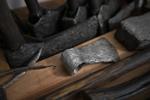
Pitted metal blades and faces from different tools lean up against a cabinet in Mark Anders’ personal collection from digs he’s conducted around his home in Charleston County, Thursday, Aug. 21, 2025, on Ravenel.
With his latest read, “The Oligarchs in Colonial Revolutionary Charleston” by Kinloch Bull Jr., Anders has been able to piece together artifacts possibly owned by Washington’s family.
Metal detectors don’t typically pick up anything larger than 10-12 inches, Anders said, so unless a remnant is a larger object, things buried about two feet or deeper are often lost as land gets backfilled and redeveloped.
“You can see the growth around Charleston and where there are these developments going up and once they’re up… that’s that’s about it,” he said.
In Poplar Grove, much of the land is still untouched, so findings are that much closer to the surface.
The original homeowners were assumed to be wealthy given the Delft China and other ruins on the property.
Anders owes a lot to Mills for allowing him to dig locally, and has even more thanks for his wife for supporting his hobby that extends to digging up artifacts and collecting sports memorabilia.
“A lot of my detecting buddies are somewhat envious,” he said with a laugh. “I’ve got such a relic rich land available to me within my own backyard.”
–postandcourier.com

